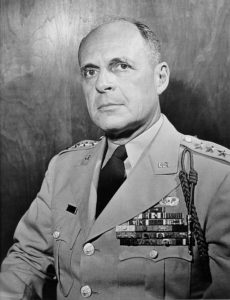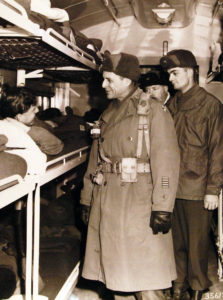Few people today are familiar with the life and career of the American soldier Matthew Bunker Ridgway (1895–1993), who retired from active duty with the Army in 1955. Certainly he is not as widely known as Ulysses S. Grant, Dwight D. Eisenhower, George S. Patton, or Douglas MacArthur. This lack of recognition is owing chiefly to Ridgway’s having been the top general in a forgotten war, Korea, following his exemplary service leading the 82nd Airborne Division and the XVIII Airborne Corps against the Axis Powers in Europe in 1943–45.
Professional historians rate General Ridgway as one of the best battlefield commanders of the twentieth century. President Ronald Reagan recognized his contribution when he bestowed on him the Presidential Medal of Freedom. In his remarks at the awards ceremony on May 12, 1986, the president observed that “heroes come when they’re needed; great men step forward when courage seems in short supply… And there was Ridgway.”
Because he was thoughtful and perceptive as well as brave, this soldier also warrants our respect for his reliable grasp of grand strategy, a fraught domain that is at least as contested in our era as it was during World War II and the Cold War. This article proposes that we see Matt Ridgway in a fresh perspective: as a conservative internationalist who well represented the strengths of this balanced outlook. Ridgway supported free institutions, defense alliances, and unsurpassed military might. But, a principled realist, he opposed projecting this force beyond the range of national interests and sustainability.

Even if they see aspects of his record to quarrel with, observers will find in his performance and pronouncements a coherent vision, which leaders of both major political parties have been criticized for failing to set forth clearly and enact successfully since the turn of the present century. Although arising from the conflicts of his day, his views remain suggestive, as history—rather than ending, and never quite repeating—rhymes. A Ridgway redivivus would not need long to get up to speed on the great-power confrontations, regional conflicts, and perimeter challenges facing defense analysts in the third decade of the twenty-first century.
Notwithstanding some differences between them, scholars of foreign policy—especially Henry R. Nau, Paul D. Miller, Colin Dueck, and William Anthony Hay—speak of conservative internationalism as a grand strategy that combines the strengths of liberal internationalism and realism while lopping off each alternative’s weak points. Conservative internationalists strive to avoid, on the one hand, runaway idealism, culminating in overly ambitious nation-building ventures in regions beyond the scope of America’s security requirements, and, on the other hand, amoral cynicism, leading to withdrawal from world affairs and indifference to a fair and open, rule-based international order.
While sanctioning participation in alliances based on mutual defense and shared principles, conservative internationalists, who value nations’ sovereignty and diversity, are cautious of putting their full faith and confidence in centralized transnational bureaucracies. Diplomacy, on their view, stands the greatest chance of success when backed by predominant military force. Outstanding examples of conservative internationalism in the twentieth century are the foreign-policy records of the administrations of Harry Truman (1945–53) and Ronald Reagan (1981–89).
Because grand strategy tends toward the abstract, it often appears ambiguous in its application to specific cases—at the very moment, in other words, when decision-makers most need prudent guidance from the best interpretive framework. As the work of one man, Ridgway’s recommendations in respect of US security strategy were reflections of his personal and professional experience, not deductions from cerebral calculations alone or from academic theory divorced from reality.
Ridgway’s judgment was rooted in a thorough grasp of the facts of each situation, in moral principles related to fighting a just war, in historical knowledge and battlefield experience, and in a love of the Republic and a deep commitment to its constitutional system. His strategic outlook balanced assisting allies and strengthening the liberal order with fortifying American power and defending his nation’s interests. For example, as supreme allied commander in Europe, 1952–53, he worked hard to improve a joint defense structure that shared responsibility to thwart a possible Soviet attack. He labored, in particular, to increase NATO’s force commitments and to improve the alliance’s logistical support, training, and airpower capabilities. Throughout his career, his defining characteristics as a leader were fortitude and prudence.

In the war against the communists in Korea, his methods turned around a desperate situation in fewer than a hundred days. He personally set a high mark—and relieved any officer who failed to meet his standards for smart, aggressive performance. By no means, however, was Ridgway a hell-for-leather warrior prodigal of his soldiers’ blood. A devout Christian and occasional Episcopal churchwarden, he affirmed that “all lives are equal on the battlefield, and a dead rifleman is as great a loss in the sight of God as a dead general.”
Although famous for instilling hope in exhausted troops and demoralized commanders, Ridgway was a conservative internationalist because he was a realist. His parameters incorporated a sense of the tragic, including a clear-eyed assessment of human nature. He knew how matters could quickly—or slowly, almost imperceptibly—turn south.
As chief of staff of the Army (1953–55), Ridgway came into conflict with President Dwight D. Eisenhower and his secretary of defense, Charles E. (“Engine Charlie”) Wilson, who wanted to slash the defense budget, with most cuts affecting the Army. Parochial service loyalty did not prompt the Army chief’s opposition but rather his disregard for Ike’s entire strategy of massive nuclear retaliation as a defense policy aimed at intimidating the communists into keeping the peace and avoiding aggression. Ridgway believed that massive retaliation was wrong for reasons both moral and military: it was “repugnant to the ideals of a Christian nation,” he said, and far too restrictive.
Defense allocations for men and materiel, Ridgway argued, should ensure flexibility: the US should have a variety of response capabilities, including conventional ground forces appropriate to a range of challenges in different situations around the globe. He pointed out that when nuclear parity occurred, the Soviets would hold an advantage. Were they to provoke a limited confrontation in which no nation could justify the use of nuclear weapons, American armed forces might lack the means to oppose them. Hence, he argued for “selective retaliation” as an alternative to massive retaliation.
In the 1970s, Ridgway deplored what he saw as weaknesses in US defense capabilities. During the administration of President Jimmy Carter, therefore, he and 200 like-minded individuals of national stature formed the Committee on the Present Danger to make the case for increased military spending. He was happy to see Ronald Reagan, who held views similar to his, take the helm in 1981.
Ridgway was a courageous general with a drive to prevail, a proponent of strong military alliances and of armed diplomacy, a warrior with a hatred of communism for its assault on human dignity, an activist for indomitable military power—and yet not an untethered hawk. This combination is what makes him so interesting, well worth our continued engagement and reflection more than 65 years after his retirement from the Army.
Although Eisenhower had his differences with Ridgway over his administration’s New Look defense policies and declined to appoint him to a second term as Army chief of staff, Ike respected the general’s wartime record and heeded his counsel. In the first half of 1954, many in the Eisenhower administration were pushing for increased American military involvement in Vietnam. Admiral Arthur Radford, chairman of the Joint Chiefs of Staff, wanted to use US airplanes to bomb Vietminh forces surrounding the besieged French garrison at Dien Bien Phu. Ridgway argued against Radford, taking the position that “United States capability for effective intervention in the Dien Bien Phu operation was altogether disproportionate to the liability it would incur.” An American military response would require “a dangerous strategic diversion of limited” forces and would commit the United States to “a non-decisive theater” in pursuit of “non-decisive local objectives.”
Proponents of intervention, Ridgway noted, underestimated the amount of time and force necessary to achieve a result that was likely to be no better than a stalemate. He knew that “none of those advocating” American armed intervention “had any accurate idea of what such an operation would cost us in blood and money and national effort.” His arguments for “the vital national interest” and against what he termed “wishful thinking” and overextension influenced the other service chiefs, the US Congress, and the British—as well as the president.
By the end of April 1954, Eisenhower had decided not to intervene militarily in Indochina. In a meeting of the National Security Council on April 29, he cautioned against “getting ourselves involved in brushfire wars in Burma, Afghanistan, and God knows where.” Historians credit Ridgway with having a major impact on Ike’s decision not to replace the French with American soldiers. David Halberstam, author of The Best and the Brightest, an account of the failure of brilliant but overly sanguine liberal internationalists in Vietnam, called Ridgway “the one hero” of his book.
Matt Ridgway relied on God—the way soldiers often do—as a source of solace before going into battle, resigning himself to the divine will. But he also saw God as a challenger, not merely a comforter. In his memoirs, titled Soldier, Ridgway writes, “When the day comes for me to face my Maker and account for my actions, the thing I would be most humbly proud of was the fact that I fought against, and perhaps contributed to preventing, the carrying out of some hare-brained … schemes which would have cost the lives of thousands of men.” Soldier was published in 1956. In it Ridgway appends this comment to the foregoing: “To that list of tragic accidents that fortunately never happened I would add the Indo-China intervention.”
One of his leading biographers, Jonathan Soffer, astutely remarks that Ridgway’s arguments against US military action in Southeast Asia “combined his conservative Christian outlook with practical politics.” In his reasoning about foreign relations, Ridgway was a conservative internationalist, but clearly something more was at work in his judgments than theories about grand strategy.






